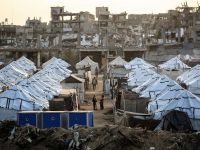Syria and Russian signed on Friday an agreement covering comprehensive bilateral cooperation, reported the Daily Star newspaper.
The agreement was signed between Syrian Minister of Economy and Foreign Trade Mohammad Al Imadi and Russian Minister of Industry Alexander Dondokov in Moscow.
The deal covers all aspects of mutual cooperation in the fields of finance, culture, commerce, education, trade and infrastructure.
Special emphasis will be placed on improving trade, and on exporting Syrian fruits, vegetables, olive oil, and meat to Russia, said the paper.
Textiles, which have been sold to Russia for 30 years, but which have recently declined in terms of trade, will also be given special attention.
Syria’s gas reserves, which currently receive priority attention from the government, were also a part of the protocol, which pledges Russian support to extract, invest in, and upgrade Syria’s gas reserves. Another focus will be on road construction, railroad projects, civil aviation, and health services.
Dondokov described Syria’s economic relations with Russia as historically strong, pointing out that the current administration in Moscow wished to “re-activate economic and commercial ties with Damascus to a stage in which they were before,” said the paper.
He added that in the past, trade between both countries had reached $1 billion. In Moscow, he claimed, “there was a definite will to reactivate these ties.”
Other parts of the agreement are cultural and educational.
Both ministers decided to increase bilateral cultural exhibitions and concentrate on movie production.
Joint theatrical works will be made, and a “cinema week” will be held for Russia in Syria and vice versa. Syrian musicians and artists are welcome under state sponsorship to study and work in Moscow, said the paper.
The educational pact that was signed runs until December 2003, facilitating joint education programs and exchange between Syria and Russia, the paper added.
For the next two years, Syrian instructors and professors will be invited to Russian universities for training courses on a quarterly basis, and students will increase their exchange visits.
Cooperation in curriculum and policy will also be given special attention, and the education pact also covers physical education, arts, culture and the sciences.
A follow-up meeting on how the agreement is being implemented was scheduled for the first half of the year 2002 in Damascus, with no specific date given, according to the paper – Albawaba.com







